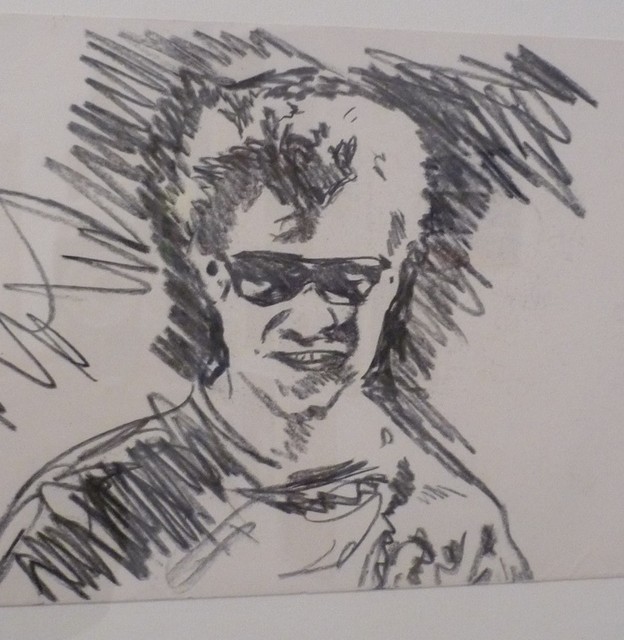Mister L.D.

Laurie Duggan is a prominent Australian poet who has been living in Kent, England for the past six years. At the end of last year Fewer & Further published Laurie's chapbook Allotments (with a cover by Basil King) and Shearsman Books, in the UK, has recently published his sixteenth collection of poetry called The Pursuit of Happiness.

In 1983 Laurie's poetry writing took a new direction from his earlier work and he began an epic project. The Ash Range is a long documentary poem that mixes prose, poetry, reportage and illustrations. It narrates a history of the settlers' engagement with Gippsland, a southerly region of the state of Victoria. Like William Carlos Williams' Paterson, which concerns itself with small-town New Jersey, The Ash Range is not constrained by its locality, but instead finds the universal in its extended examination of the local. While the work is enormously ambitious in its mix of materials, the whole is welded into a solid structure that facilitates communication of the theme, even to an audience that is unaware of the territory it describes. It was originally published by Pan Picador in 1987 and there was a second edition from Shearsman in 2005.
 The Ash Range, original version, 1987
The Ash Range, original version, 1987
Matt Simpson, writing in Stride magazine, said; "What The Ash Range offers is an elegiac three-dimensional portrait of an area of south-eastern Australia, the region of Victoria called Gippsland. The work is epic, not just in scale nor simply in being divided into twelve parts, but in the sense that at heart it constitutes a search for roots, a journey home. That said however, and despite the fact that Duggan's forbears come from Gippsland, it is in no way a 'family' poem, what Geoffrey Hill once disparagingly called a 'home-movie'. The hero of the poem is Gippsland itself, which Duggan has described elsewhere as 'a larger than life place.' This larger-than-life quality is attained by means of collage, a judicious artistic manipulating of extracts from diaries, journals, newspapers, which cumulatively recreate, as it were, the collective unconscious of the place. The effect is kaleidoscopic and haunting—haunting in the sense that ghosts as firsthand witnesses are let loose to make play with your imagination, to describe the shape of the land as it was first seen by explorers and settlers, to document the trials and tribulations of colonising, 'civilising', digging for gold, living through storms, floods, bush-fires. The poem makes its way, with one or two skips in time, chronologically, from the second half of the eighteenth century and Captain Cook to a point not long after Duggan's birth in 1949. We experience Gippsland as something growing almost organically, as cumulative history, a kind of reverse archaeology. Whatever the research procedures of Duggan's 'map and history project' may have been, the achieved poem is not a digging-down but a piling up, its effect is voice-over filmic (the poet has written scripts and taught media courses). Despite its deliberate exclusion of the solipsistic, it is still a Romantic poem in that it stunningly evokes the spirit of place with an implied nostalgia, and explores the question who am I in terms of the history I have emerged from. And that is part of its universality, how, in words from the back cover, it 'transcends locality'. . . . It is an important work—and not just of Australian literature."
In the year 2000 Laurie Duggan made his first appearance in Jacket when the magazine reprinted his article on Paul Blackburn that had been first published in Scripsi magazine in Melbourne in 1986. It was called "Mister P.B."
In 2001 Laurie published a work of cultural criticism, Ghost Nation: Imagined Space and Australian Visual Culture, 1901-1939 (UQP, St Lucia), that looked at early twentieth-century Australian modernism via the work of photographers, painters and architects. The plurality of images ghost each other within time to give an understanding of interdependence and discontinuity in the construction of twentieth-century visual culture.

In 2002 Jacket editor John Tranter invited me to compile a feature in collaboration with the literary quarterly Overland magazine where I was the poetry editor. I included ten of Laurie's poems.
Laurie Duggan contributed work to Jacket on various occasions, including a short poem for Carl Rakosi's 100th birthday and an anecdotal narrative on meeting Gael Turnbull in memoriam on his death in July 2004. His own work was reviewed in issue 27 by Tasmanian poet, Angela Rockel and a selection of his long, intermittent yet serial, project Blue Hills was published in the same issue.
Three years later, in Jacket 34 Laurie wrote a review article on Gael Turnbull’s Collected Poems, "with a digression on his aleatory, kinetic and other off-the-page practices" and we published two extracts from his long poem 'The skies over Thanet' in the same issue.
In 2010, on his blog 'Graveney Marsh', Laurie Duggan commented on the lack of financial support in Australia for ventures like Jacket magazine . This note also expressed the mild apprehension of the magazine's editorial change held by many of the poets and writers who had contributed to the original Jacket magazine. I agreed with Laurie's remarks then and I can report that Australian magazines that include international work alongside local material still can't attract local state funding for their pursuits. Though now, I'm pleased to say that the transition from Jacket-the-first to Jacket2 seems to have been a successful venture and that the Commentary columns, co-ordinated by Jessica Lowenthal, continue to canvass opinion and information on poetics from a broad, global range of English language writing and translation.
Jacket the first